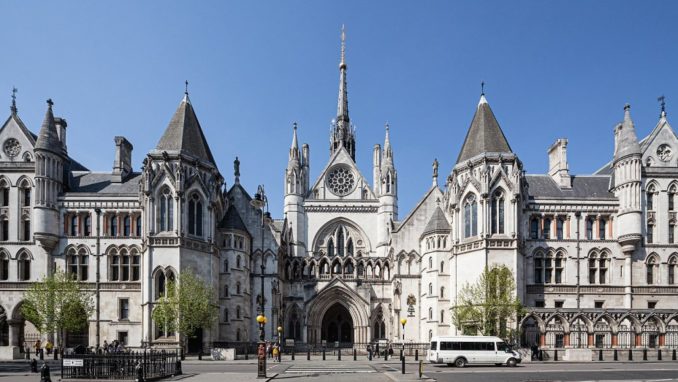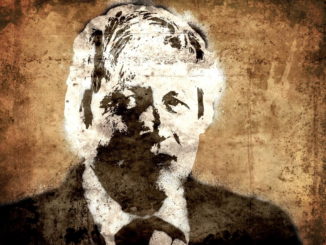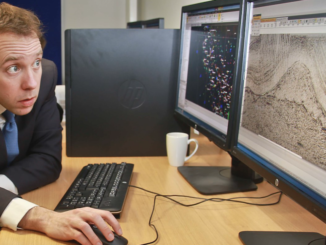
This image was produced David Castor, CC0, via Wikimedia Commons
When, this bloody war is ooooover,
Oh, how happy I will beeeee.
That’s how I feel about that virus!
At some stage, we do need to get back to normal. Remember those days, when you’d get told off if you went into the building society wearing a mask. When you thought nothing of taking a commuter train packed with other people. When you used the self-service till at the supermarket and didn’t feel the need to perform a ritual cleansing exercise afterwards. When you could leave your home whenever you felt like it.
There are plenty of people talking about changes to our society when this virus finally goes away. You can spot them easily because they are all saying we must Build Back Better, and in every case what they mean is that we must implement the crackpot social changes that they were arguing for long before the coronavirus came along. Don’t let a good crisis go to waste is their motto. Dancing on the graves of the people who have died, I call it.
Now, we might be in the early stages of a multi-pronged attack on humanity that will leave the survivors, like Mad Max, prowling a post-apocalyptic landscape searching for scraps of food and motorcycle maintenance spares. I prefer to believe that we’ll get through this and that we’ll return to a sensible society.
But when we do regain our equilibrium, we urgently need to look back at what happened, what we did about it, what worked and what didn’t, and how we do better next time. For there will be a next time. What’s that saying about history? That it doesn’t repeat itself, but it does rhyme?
We must not repeat the past year and a bit. There does have to be some form of inquiry so that, in that much-overused phrase, lessons can be learned.
OK, so we set up an inquiry. The twin challenges here are to avoid ‘producer capture’ and to stop the whole thing being kicked into the long grass. We need a rapid response and one that won’t whitewash anyone.
The key decisions will be the person appointed to head the inquiry, and the scope given to the inquiry. Breeds there a man or woman in the mould of Eliot Ness or Sir Robert Mark?
The Grenfell Inquiry split into stages, with an initial report on the fire and a later part on the wider causes. This seems to be a better model than the Child Sexual Exploitation inquiry which appears to have been running for ever.
Part The First should look at the urgent questions: what we need to know before either there’s a new outbreak, or the society-reorganisers get too far into their strides. The scope could include:
How virulent the virus is or was. How many deaths occurred ‘from’ the virus, how many ‘with’ the virus, and how many from other causes?
What proportion of infections, and deaths, resulted from catching the virus in hospital?
Who was at risk from the virus?
The forecasts of virus deaths, the methodology used and how the predictions compared with reality.
Those PPE shortages and whose fault they were.
The rush for ventilators and how useful (or not) they were.
The decision to close the NHS to non-coronavirus patients, and the impact of that decision – missed diagnosis and treatments for cancer, heart disease and so on.
The efforts to control the virus, such as lockdowns, masks, social distancing and so on (collectively, ‘non-pharmaceutical interventions or NPIs). Did they work or did they not?
What work was done on repurposing of existing, tested, drugs against the virus?
How the vaccines were procured, developed, and rolled out – which seems to me to have been a big UK success so far. (The EU, not so much…)
How the test and trace initiative performed. You can buy a battleship for £37 billion, for goodness sake.
The Nightingale hospitals, both their speedy construction and how they were to be staffed in case of need.
The emptying of patients from NHS hospitals into care homes, and the effect on residents. Did we really transfer infected patients out of hospital into homes with already-vulnerable residents? Who ordered that?
And Part The Second should investigate all those other things we need to find out, but which are not as urgent:
Where did the virus come from?
How did it spread?
Is there a standing body tasked with keeping an eye on virus outbreaks and advising us what to do? If so, how good was its advice?
Did the UK have a virus contingency plan?
Did we implement the contingency plan, and how did it work? Or, did we not implement the plan and why not?
Were there any planning exercises or wargames done, say, in the NHS about a virus outbreak? What was the outcome, and were the findings implemented?
What was the role of the media, both in holding government to account and in providing information to people?
How did the government use media, both traditional and social media? Was there a policy of oderint dum metuant to encourage compliance with government edicts?
How did other countries cope? What were their infection rates and their death rates per million population? Who did best and what did they do?
How did the Health Service perform in each part of the UK, and how much help (or otherwise) were local politicians? Was it a good thing for health policy to be a devolved matter, or would a nationwide approach have been better?
There will be triumph and disaster aplenty to be found in the tale of the virus. What matters is that we recognise each of Kipling’s two imposters and reward the people who did well, and punish (yes, punish) those who did badly. If routine medical treatments were stopped, for example, and harm befell a patient as a result, the people taking that decision should not go unscathed into early retirement with enhanced pensions. I wouldn’t go as far as a strict application of lex talionis, but complete elimination of jeopardy removes the incentive to do one’s best.
In banking we have the phenomenon of ‘too big to fail’ where the state rescues the failures and so there’s no incentive to be prudent in business activity. Let’s not make that mistake here, let the inquiry apportion credit and blame where they are due.
© Jim Walshe 2021
The Goodnight Vienna Audio file



